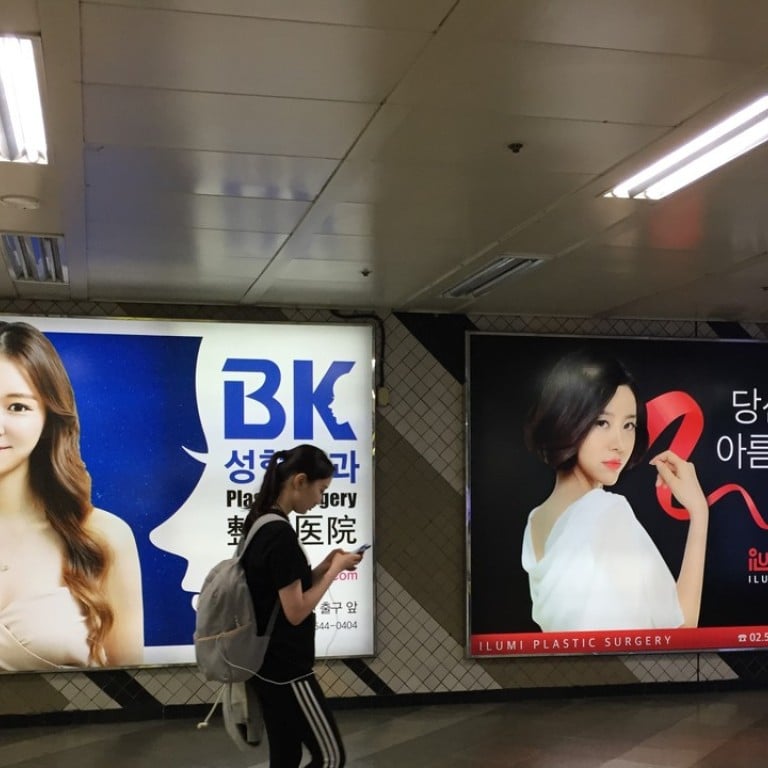
Being ugly hurts in South Korea: why it’s so hard to say no to K-beauty
In a country known worldwide as a mecca for plastic surgery, a movement against lookism has caught fire as women join forces to protest impossible beauty standards
While South Korea’s #MeToo and anti-molka (hidden camera) movements continue to explode, the nation is also in the grip of “Escape Corset”, a social-media-based movement protesting the country’s impossible beauty standards.
This summer, women went barefaced on Twitter, Instagram and other online communities as they threw away their CC cushion compacts and lipsticks, while some even cut off their hair as they railed against the lookism so prevalent in South Korea.
“I hated my ugly face. I had low self esteem and wore make-up like a mask [all day],” an Instagram user wrote beneath a photo of her destroyed makeup collection. “We don’t have to do it. [I realised] we don’t have to be pretty … and took off the mask that was ruining my life.”
Beauty YouTuber Lina Bae published a video of herself applying makeup along with comments she’d received about her appearance: “Your skin isn’t good [as a] woman, please apply BB cream … I would kill myself if I [looked like] her.” By the end of the video, Bae had defiantly removed all her makeup.
The Escape Corset movement confronts core beliefs about why women must care about their appearance, according to a Harvard gender-studies scholar who asked not to be named in this story. “Radical feminists in Korea began the movement by shaving their heads, removing their makeup and dressing in ways that allowed their bodies to be more active,” she said.
This takes a rare willingness to stand out in highly status- and image-focused South Korea, where one’s appearance is a prized commodity and beauty is considered a component of a woman’s success. This contributes to the country’s reputation as a plastic surgery mecca, where an estimated one in every three women have undergone some form of cosmetic procedure.
Outside of beauty ads and plastic surgery marketing, another cultural quirk which is frequently a central theme in Korean dramas is the notion of becoming more beautiful – which then leads to other successes in life.
The main character of the 2018 television series My ID is Gangnam Beauty undergoes a dramatic image transformation by having cosmetic surgery just before she enters university, and instantly becomes a popular and romantically sought-after member of her freshman class.
In True Beauty , a hugely popular webtoon series, a high-school student is similarly transformed into an unrecognisable beauty after harnessing the power of YouTube makeup tutorials. There’s also an episode of the web series Thursday, in which a young college student talks about the experience of being treated better by her peers and strangers after having plastic surgery.
While these are works of fiction, they reflect a reality all women face. And it’s not just adult women – Korean children and teenagers say they feel pressured to wear cosmetics in order to fit in. In a 2015 survey by a local broadcaster, 91.6 per cent of junior-school-aged girls had worn makeup at some point, while a 2017 Korea Herald report said most girls between the ages of 10 and 12 owned on average three cosmetics products – mainly lip stains or BB cream.
“In South Korea, the standard of beauty is out of our control. Typically, women should have fair skin, be 162cm to 168cm tall [over 170cm is too tall] … weigh less than 48kg, have large eyes, a perfect nose, and long hair,” said the Korean gender studies expert.
“These standards are common [for women] when applying for part-time jobs that don’t require much skill. ‘If a cashier is pretty then customers will enjoy the experience better, [therefore] we should hire pretty girls’ – this becomes treated like a true statement.”
Ultimately, women should be allowed to be themselves, she adds. “We should see women as they are, rather than only accepting them when they’re decorated and dolled up. ■

